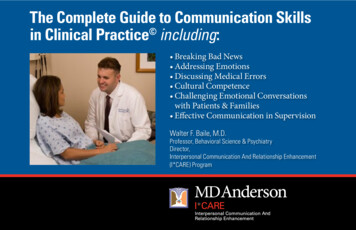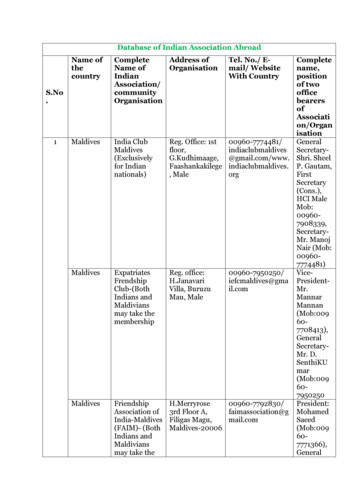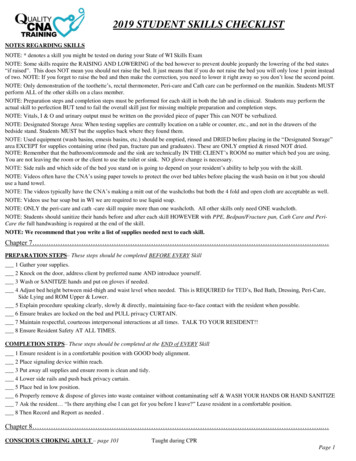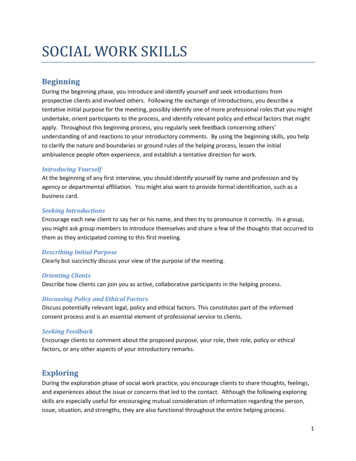
Transcription
THE PREACHER’SCOMPLETESKILLS GUIDEBY:1 Christianity Today International
THE PREACHER’S COMPLETE SKILLS GUIDEEditor’s Note by Matt WoodleyIt happens every Sunday. Week after week, in churches across the globe, someone standsup to preach a sermon. Regardless of church location—Manhattan, Lagos, Singapore, Rio deJaneiro, Chicago, Phnom Penh, Brussels, or Barnum, Minnesota (population 460)—regardless ofdenomination—Baptist, Anglican, Lutheran, Pentecostal, or Presbyterian—you can (or at leastshould) count on one common thing in the worship service: a sermon. Someone will stand upbefore the people of God and declare, “This is the Word of God.”The sermon is a rare and daring art form. It’s a combination of Bible study, theological reflection,creative essay, pastoral encouragement, prophetic challenge, loving appeal, Christian catechesis,and old-fashioned storytelling. As a friend of mine from London recently said, “Where else inour culture do you see volunteers listening (without interruption) to someone talk for about 30minutes”? It’s a strange mode of communication.But for followers of Christ it will never get outdated. According to the Apostle Paul, “Faith comesfrom hearing, and hearing through the Word of Christ” (Rom. 10:17). Of course God worksin many ways besides a sermon, but many of us started following Jesus or matured in Christthrough a similar process: Someone wrote and then preached a sermon. God used it to touchour heart. Christ brought us from death to life, or from sin to repentance, or from ignorance totruth. What made the difference? The power of the Holy Spirit worked through the humble, bold,loving act of someone opening God’s Word to us.At PreachingToday.com we believe in the power of preaching. We believe that it’s a supernaturalprocess and a human craft. God produces the results, but he uses our human (and sometimesflawed) efforts. Over the past 25 years working to inspire and equip preachers, we identified ninestages of a preacher’s life. Then we invited nine of our finest contributors to write a “foundationalarticle” on that aspect of preaching. This booklet contains all nine of those nuts-and-boltsfoundational articles.Here’s a brief summary of what we’ve called “The Preacher’s Complete Skills Guide,” or the ninestages of a preacher’s weekly sermon prep rhythm:1. Prepare Your Soul. Preaching always comes through a preacher’s heart and life first. Sothe first step is not to illustrate or apply the text for others. The first step is to live the textsthat we preach to others.2.Plan Your Preaching. At some point you have to determine how you will preach throughGod’s Word. Haphazard or poorly planned preaching schedules cannot convey “the fullcounsel of God.”3. Get the Big Idea. As Dr. Haddon Robinson was fond of saying, “Preaching should be a rifleshot, not a buckshot.” In other words, sermons are most effective and memorable whenthey revolve around one central, big idea—an idea drawn from a specific biblical text.2
THE PREACHER’S COMPLETE SKILLS GUIDE4. Organize Your Sermon. As preaching professor Dr. Joel Gregory says, at some point thepreacher “Must bring ‘order’ to the sermon out of the ‘chaos’ of the material.”5. Find the Big Story. Every biblical text belongs in the larger story of God’s story ofredemption in and through Jesus Christ. This chapter explores how to connect yoursermon to the life, death, and resurrection of Jesus.6. Illustrate Your Sermon. As Bryan Chapell argues, “Illustrations do more than adorn thoughtor clarify what is difficult to understand . [They] persuade, stimulate involvement,touch the heart, stir the will, and result in decisions.” Here are some practical ways toillustrate effectively.7. Apply the Message. Every sermon should answer the following simple question: So what?In other words: Who will be listening to the sermon and how can you help them live whatthe text says?8. Deliver and Evaluate Your Sermon. Every sermon should be delivered with passionand clarity. We should also have a way to evaluate our preaching so we can keep growingas preachers.9. Plan Special Topics. Finally, we also noticed that preachers need some special resourcesand inspiration to preach during those high-pressured big days, like Christmas, Easter,Holy Week, Mother’s Day, and so forth.Of course this isn’t the only way to approach your weekly sermon prep process. Nor do thesearticles provide everything you need to know on every preaching subject. But it’s a good place tostart our journey of offering our sermons to Jesus week after week. It’s a good framework to thinkthrough areas where we’ll need to grow in our preaching.But always remember that every time we stand up to preach we don’t make anything happen.In Paul’s marvelously simple and liberating words, “God gives the growth” (1 Cor. 3:6). Or as themaster preacher Haddon Robinson, liked to say, “Of course, we will not give God that which costsus nothing Yet in the final analysis there are no great preachers. There’s only a great Christ whodoes startling things when we place ourselves and our preaching in his hands.”Matt Woodley, Editor3
PREPARE YOUR SOULPrepare Your Soul to Preach by Lee EclovIntroductionPicturte a lone prospector peering into a cave on a barren Arizona mountainside. He’s heard“there’s gold in them thar hills” so with nothing more than some grub, a lamp, and a pickaxe he’scome to this mountain looking for a vein of gold. He lights his lamp and heads into the darknessin hope of striking it rich.Preparing to preach is like that. For most of us it is quiet, solitary prospecting. In school welearned how to study the Bible, the pickaxe work. Diligent study is harder and longer than mostpeople imagine. If we are decent preachers the Word seems so clear by the time our people hearit they might be inclined to think that we just found scriptural nuggets glittering on the ground.As difficult as study is, I at least know what I’m doing in that realm. I was taught well in the skills ofexegesis, hermeneutics, and homiletics. But intertwined with our preparation of the Word is theweekly preparation of our own souls. I don’t know which part takes longer but soul work for me ismore unpredictable and often troublesome.Once I asked several pastors just exactly how they prayed for their sermons. A common responsewas, “Well, before I start I ask God to help me and to bless my work. Then I get at it.” That’s agood start but it doesn’t have much to do with the preparation of our souls. Apart from suffering,sermon preparation is the most rigorous soul work I know. Although there are exceptions, Isuspect that sermons only go as deep into the hearts of our hearers as they have into our own.Get quietNothing inhibits my study more than the noise within. Spiritual work cannot tolerate manydistractions. My “do list,” emails, and Post-It notes chatter on in my head so that God himself canhardly get a word in edgewise. What’s more, my dull-headed weariness drones on like a 4 p.m.lecture. “Be still and know that I am God” is no small command. Prayer, at this stage, isn’t a matterof what we say. It is just trying to quiet the relentless yapping inside.Besides that, every single time I sit down to study I feel I’m already behind. Too much to do; toolittle time left to do it. I always feel like the White Rabbit who raced by Alice dithering, “I’m late,I’m late, for a very important date.” When we feel like that, prayer can seem terribly inefficient; aluxury even. “I’d like to pray, of course,” I tell myself, “but God understands. I have got to get thisdone.” God does understand and he will help. But I just can’t hear him very well if I don’t quiet mysoul. I study the words but miss the message. “Though hearing, they do not hear or understand.”Get smallWhen our son was young we would take him to a nearby park to play on one of those huge“recreational structures,” a wooden wonderland full of passages and hideouts, swinging bridgesand towers. A guy could get lost in there. Or in my case, stuck. It was an environment meantfor small people. God’s kingdom is like that, as is the study of Scripture. You have to be small4
PREPARE YOUR SOULto maneuver without getting stuck or banging your head. Jesus said, “Truly I tell you, unless youchange and become like little children, you will never enter the kingdom of heaven.”The gate into every passage of Scripture is low and narrow. We can try to squeeze in, big lunksthat we are, or we can allow the Holy Spirit and the sacred text to make us small. Every passagecarries a kind of humility potion. Every role Scripture takes—“teaching, rebuking, correcting andtraining in righteousness”—resizes us if we drink it down. If we let the Word work itself into ourhearts.To begin with, take stock of your heart. That can be like asking a shifty-eyed eight-year-old whathe’s been up to. You’re not likely to get a straight answer at first. Persistence is necessary. Notall our sin and dishonesty lays brazen on the surface. We don’t always see how swollen we’vebecome inwardly. It’s not easy to tell when you’ve gotten too big for your britches. So we prayoften, “Search me, God, and know my heart; test me and know my anxious thoughts.” God willuse your text like a stethoscope.Our pastoral work—especially preaching—should make us great-hearted but it can backfire andjust make us big-headed. You can start to think, “All these people came to hear me.” We canbecome like a kid with a Superman cape ready to jump from the roof. Of all the Bible’s failures,Samson is the one who makes me most twitchy. I have never forgotten a time many years agowhen I got up to preach even while sin, like Delilah, snipped away at my God-given strength. Mywords that day had no lift, no life, no muscle. I do not want to ever forget the ominous shadow ofthe sightless Samson.Besides making us right-sized, humility is a relief. Humility is rarely comfortable, but it is arelief. It’s hard to hold in all that spiritual helium. A humble soul can maneuver gracefully in thepassages of the God’s Word. Small preachers are the best preachers.Work with meWe never come to sermon preparation in a neutral frame of mind. Frustration or enthusiasm,weariness or worry, all crowd up to the desk with us when we study. Such things are actually partof our soul’s preparation. God intended you to preach this text in the midst of this week. Thus, Icannot ignore what is happening inwardly. Good sermons, like pearls, are often God’s beautifulWord coating an irritating grain of sand.Gordon T. Smith writes about a time when he was frustrated with some colleagues. His spiritualdirector told him, “Well, Gordon, it is sometimes helpful to remember that ‘difficult people are thefaculty of the soul.’” Sometimes before I can preach I have to deal with the toxins that have builtup inside. That soul work brings an authenticity and thoughtfulness to my sermon.Prepare to serveYou’ve been in a restaurant where your waiter greets you, “Hi. I’m Jack, and I’ll be your server thisevening.” Server didn’t used to be a word. I think restaurants made it up because most waitersare not willing to say, “I’ll be your servant this evening.”5
PREPARE YOUR SOULMany of us love preaching God’s Word so much that we’re sort of amazed anyone would pay usto do it. We want to serve Scripture. We love the privilege. However, Scripture doesn’t always letme say what I want to say. Have you ever hammered out part of a sermon only to hear your Biblewhisper indignantly, “That’s not what I’m saying”? Has the Holy Spirit ever scolded you, “Enoughwith the clichés!” or “That story you want to tell is more about you than me.” Scripture can be atough customer.Paul wrote in Col. 3:16, “Let the word of Christ dwell in you richly, teaching and admonishing oneanother in all wisdom ” Stop. Look at it again.Let the Word of Christ. That is our text, whether it is from Deuteronomy, John, or Hebrews. JesusChrist is speaking and he is the text come alive.Dwell. Like the God in his wilderness tabernacle. Like Jesus incarnate in this dark world.In you. Like manna or the bread and wine. Like the Spirit at Pentecost.Richly. In all its glory. Filling you till it is fulfilled in you.A prepared soul requires the rich residency of the Word. Then we are ready to teach andadmonish. Not before.Paul continues in that verse, “singing psalms and hymns and spiritual songs, with thankfulnessin your hearts to God.” When we have served Scripture well teaching and singing are hard totell apart. Good preaching has a kind of melody, like harmonizing with the Lord. When I wasa boy standing next to my mother in church I’d hear her singing alto during the hymns. I stillremember when I figured out how to do that—how to find the pitch a third below the melodyand harmonize. Prayer during sermon preparation is how we find our pitch and bring our voiceinto harmony with God’s Word. It’s a beautiful thing.Being a servant also requires me to consciously serve my congregation. They are not sitting outthere for me. I’m there for them. Whether it suits me or not, I must meet them where they are.Recently a couple of my most gifted women’s Bible study leaders came to me in frustration. Mostof the women in the group they lead just won’t participate. Neither of these two experiencedleaders could get them to respond or share. The leaders were thinking about starting anothergroup for women who would do their homework and participate. After we’d talked awhilesomething dawned on me. “You know, we should thank God that they’re coming,” I said. “Theseare women who love the Lord and make it a point to be there. Even if they don’t say a wordor prepare as we’d like, we would rather have them there than not coming! After all, we’re theservants.”A couple days later one of leaders wrote me that she’d been reading in Luke how the crowdscame to Jesus. She wrote, “Jesus didn’t turn them away just because the people had a differentagenda than he did. No, he welcomed them.” She went on, “Here’s where the ladies’ study comesin and where I think God is taking me: I need to get over myself. It’s not all about me and me notusing my gifts. These women are coming, I need to welcome them, and share with them aboutthe kingdom of God.” Now her soul is ready to take up the Word.6
PREPARE YOUR SOULFlexing faithSome parts of faith come easily to me as I study. For example, I trust that Scripture is really Godspeaking and that these are the words of life. I trust that God will use me to preach, a gift ofgrace. I trust that the people who listen will become better disciples of Jesus by listening. Thosethings are usually easy for me to believe.The hard part of faith is often more subtle than those things. Faith isn’t only thinking a thing istrue. Faith is also the spiritual openness—vulnerability—to draw that truth into my actual thinkingand actions. For example, I believe Jesus when he said, “Blessed are those who hunger and thirstfor righteousness, for they shall be filled.” But before I can preach it I need to believe it enoughthat I feel the hunger pains and realize how parched for righteousness I am. That is where faithisn’t so easy. Getting my soul situated can take more time than reading commentaries! In thatsense, soul preparation means putting off my laziness and taking up my spiritual responsibilitiesbecause I believe that will lead to the God-blessed life. I believe that if I love Jesus I will obey him.Recently I saw a more elusive side of faith in the story of Martha, Mary, and their houseful ofguests (Luke 10:38-42). The sisters had disciples to feed and the Lord Jesus himself to serve. Justlike me when I get up to preach—disciples to feed and the Lord Jesus himself to serve.Let’s assume for a moment that Martha would have loved to listen to Jesus but her sense ofresponsibility overruled. Luke says Martha was “distracted by much service.” I suppose Marthashould have remembered how Jesus fed the five thousand and sat down next to Mary. But unlessJesus did that again, her guests were going to go hungry. Duty called. Responsibility snapped itsfingers. I know that feeling. The responsibility of preaching—of feeding all those disciples andpleasing the Lord Jesus—stresses me out, too.The thing Martha never imagined was that Jesus wasn’t her guest. She was his! She wasn’tthere to serve Jesus. He was there to serve her. I don’t know how Mary, who I assume was asresponsible a hostess as her sister, showed such extraordinary faith that she could stop to listen.Not one in a thousand responsible people would have done what she did. Somehow she trustedthat Jesus wanted to feed her even more than she wanted to care for him and his followers.Which of those two sisters would you rather hear preach?To prepare our souls to preach we must allow Jesus to serve us. And that takes a unique stretchof faith—faith enough to shift the weight of responsibility from me to him. Faith enough to bequiet and listen.Eureka!When we prepare our souls as well as our texts, Jesus walks with us incognito, the way he didwith the two Emmaus-bound disciples in Luke 24. He meets the yearning of our hearts withScripture till we know what they meant when they said, “Were not our hearts burning within uswhile he talked with us on the road and opened the Scriptures to us”?7
PREPARE YOUR SOULLike the prospector we go alone into the mine with our lamp and pickaxe. Jesus said in Matt.13:52, “Every teacher of the law who has become a disciple in the kingdom of heaven is likethe owner of a house who brings out of his storeroom new treasures as well as old.” When weprepare our souls as thoroughly as our text God’s people receive great and godly treasures. Butthey also hear us shout for joy, “Eureka! Look what I found!” That is a rich congregation.8
PLAN YOUR PREACHINGPlan Your Preaching by Bryan WilkersonIntroductionEveryone loves a journey, setting out for a destination—known or unknown. They promise usnew vistas, fresh learning, unexpected thrills and challenges, and deeper relationships with thosewith whom we share the road.Preaching can be like that. Each year pastors have the opportunity to lead their congregations tonew and better places with one another and with God. That’s what we call it at Grace Chapel—the Teaching Journey. A preaching calendar is texts and dates; functional, clarifying, but not allthat inspiring. A teaching journey offers discovery and growth, for both preacher and hearers.In his book, Strategic Preaching, William Hull makes a compelling case for this kind ofintentionality in building the preaching schedule. He writes, “The most effective sermons comefrom a concerted effort to guide the congregation in achieving its God-given destiny one year at atime.” In other words, we can think of each year as a distinct and strategic leg of a congregation’sjourney toward spiritual maturity and missional impact.With that in mind, let’s plan our next trip.Choosing a destinationTravelling without a destination is called wandering. It’s a pleasant way to spend an afternoon, butnot very productive or satisfying over the long haul. (It can also look and feel a lot like being lost!)So, “What should I preach this year?” is the wrong question to ask. It too often leads to wandering.Better to ask, “Where do we want to go this year?”Every spring our ministry staff sits down to consider this question. (Our ministry year at GraceChapel runs from September to August, following the public school calendar which generallybegins after Labor Day.) Over the course of a couple of meetings and/or a retreat setting, weassess the health and vitality of the congregation and try to discern where the Lord might beleading us next. Like shepherds looking over the flock, we ask ourselves what the flock mightneed in terms of diet, environment, and direction. We typically ask questions like:Spiritually, where do we need to take the congregation next year? Here we consider whichbiblical texts, theological truths, and spiritual practices we might need to explore. Sometimesthis is driven by our commitment to teaching the whole counsel of God—balancing Old and NewTestament, narrative and didactic texts, etc. Other times we sense a weakness or a hunger in thecongregation that needs to be addressed—understanding the Holy Spirit, cultivating spiritualdisciplines, family issues, etc.Several years ago we were coming off a contentious and disheartening season as thecongregation wrestled with some internal governance issues. We sensed that we all neededsome soul-searching and spiritual renewal. We declared the next ministry year to be a year of9
PLAN YOUR PREACHINGTransformation: Becoming More like Christ. Our teaching journey that year took us through theBeatitudes, the spiritual disciplines, and the life of David.Organizationally, what needs to happen in the life of the church this year? We establish andprioritize ministry objectives and transitions for the coming year—revitalizing small groups, abuilding project, planting a church, an evangelism or discipleship initiative, etc. We don’t want oursermons to be stump speeches that simply serve to drive an organizational agenda, but they canand should provide biblical inspiration and instruction for ministry growth. A corporate CEO oncetold me how he envied pastors, who every week have an opportunity to cast vision and valuesto the entire organization! Pastors, who are both preachers and teachers, need to leverage thatopportunity.When we launched our multi-site initiative four years ago, we spent the ministry year re-visitingand re-vitalizing our core commitments to Going Deeper (fall), Getting Closer (winter), andReaching Wider (spring).Culturally, what questions and challenges might people be wrestling with this year? We attemptto discern and even anticipate regional, national, and global trends or happenings that mightimpact people’s lives and the church’s ministry. If it’s a presidential election year, a series onbiblical citizenship might be in order, or the kingship of Christ. If the nation is in a season ofeconomic decline or prosperity, there might be stewardship issues to explore, or teaching on theprovidence of God.In addition to these brainstorming and discernment discussions, I will sometimes invite a focusgroup of laypeople to sit with me for a couple hours and share their questions, challenges, andexperiences with a particular topic, like spiritual formation or family life. I invite a cross-section ofthe congregation, and send them a few thought questions in advance, and/or some biblical textswe might be considering.With input from these various groups and sessions, I go off on my own and work out a roadmap and preaching calendar. Typically I try to get away for a day or two to allow time for prayer,reflection, walks in the woods, and uninterrupted hours with my Bible and legal pad. On myAugust retreat I’ll lay out the general flow of the year from September through June, and a weekby week calendar including text, topic, and big idea through Advent. I’ll do a similar thing beforethe winter and spring seasons. Now that I have a staff to work with, I have found it helpful once ortwice a year to ask another pastor to run point on a series or two, like Advent or summer. It givesme some breathing space to be more creative and reflective, and develops them as preachers.Ultimately, it is my job as senior pastor and teacher to synthesize this input and craft a concisedeclaration of our destination for the year. Our ministry theme typically falls under one of ourthree core commitments: Going Deeper, Getting Closer, and Reaching Wider. This past year wefelt it was time to challenge our congregation to be more outward-focused, both in our personallives and as a congregation. Our Ministry Theme became, Living on Mission: Where Your LifeMeets God’s Heart.10
PLAN YOUR PREACHINGMapping the routeHaving determined a destination, the next step is to map out the route. From a teachingperspective, consider how to get the congregation “from here to there” over the next year.We often use a template that we have adapted from Dallas Willard’s work in spiritual formation.Willard spoke of an essential progression from vision to intention to means. Vision describesand clarifies a preferred future state—I want to get in shape. Intention involves a decision of thewill to move in a new direction—I will join a health club. Means describes the activities by whichwe actually make progress toward this preferred state—three workouts a week, a low-fat diet,and an accountability partner. The genius behind Willard’s approach is the simple reality thatpeople don’t typically change until they want to change, and then decide to change. If we simplyinstruct people in Christian truth and practice without first engaging the heart and the will, we getconformity without real transformation.With this formational template in mind, we map out a teaching journey that will lead us throughseasons of Vision, Intention, and Application (VIA). In the fall we cast Vision for some change orimprovement in our lives as Christ-followers and as a congregation. We try to paint a compellingpicture of whom or what we might become if we were to grow into God’s purposes for us. Therewill, of course, be plenty of opportunities for practical application in these messages, but thefocus will be on seeing the big picture of God’s will for us in this particular area. We actually callthe first Sunday after Labor Day, “Vision Sunday.”As we transition from that fall season to the new calendar year we call the congregation to makea commitment to pursuing this new and better way of living. This Intention step might take theshape of a Commitment Sunday at the conclusion of the fall series, or it might be accomplishedthrough a brief mini-series. January, with its focus on a fresh start and resolutions, is a naturaltime for this kind of emphasis and intentionality. In the spring season, we focus on practicalApplication of the biblical principles we have been learning, often with a thematic series or twofocused on relationships, lifestyle, contemporary issues, etc.This simple road map through the regions of Vision, Intention, and Application, will also includesome “side trips” to accommodate the liturgical calendar—Advent, Lent, etc.—and congregationallife—missions week, stewardship Sunday, etc. We treat the summer as a season of Renewal,backing off the intensity of the school year with a series that is visitor-friendly and that people candrop in and out of without feeling lost. We might explore the Psalms, or the parables of Jesus, ora series of biblical character studies—Unsung Heroes. (We actually produced a series of “tradingcards” for this series that people could collect from week to week, each one offering a synopsis ofthe character and message for that week.)Packing our bagsWith a destination determined through our discernment process, and a road map in front of us,we’re now ready to decide what our particular teaching texts and themes will be.11
PLAN YOUR PREACHINGThis past year, we launched our Living on Mission emphasis with a 10-week Vision series onthe missionary journeys of Paul. We followed Paul from city to city, discovering the variousdimensions of missional living that emerged along the way. I realized as I planned and preachedthe series that in thirty years of preaching I had taught Acts 1-10 many times over, but had neversystematically worked through the middle chapters of the book! Each city brought into focusa different aspect of the Christian mission—understanding God’s heart for the lost (Philippi),learning and living the Scriptures (Thessalonica and Berea), engaging the culture (Athens),etc. The compelling stories from Paul’s life on the road, with illustrations from the lives ofcontemporary Christ-followers, offered us all a better narrative for our own lives and travels.In the midst of that series, we were able to shape our two Global Awareness Sundays intothe overall theme with a focus on Joining God in Hard Places. Organizationally, the series alsoprovided biblical inspiration and vision for the launching of a third campus that fall.As we ended that first series just before Advent, we shifted into Intentional mode. On the finalSunday of the series, we “commissioned” the entire congregation with a formal charge andprayer, just as we typically commission our Summer Mission Teams. A baptism Sunday near theend of the series offered people an opportunity to make a public commitment to following Christand living on mission.In January we blended Intention and Application with a four week series entitled, Work Matters.We considered how to leverage our working lives for kingdom impact, beyond simply tithing ourpaycheck and putting a Bible on our desks. A variety of texts helped us to explore the biblicalthemes of vocation and human flourishing, as well as how to appropriately serve people andshare our faith in the workplace. Each Sunday we formally commissioned people who worked invarious sectors of society—Education and Child Rearing, Commerce and Culture Making, HealthCare and Human Services, and Government, Law, and Justice. (We typically like to offer a short,seeker-friendly series in January that might compel Christmas visitors to return. The practical, liferelated focus on work accomplished that effectively.)Continuing the Intentional emphasis, we spent the month of February tracking Jonah, thereluctant missionary. We explored the internal and external forces that tend to keep us fromliving on mission.The season of Lent provided an opportunity to take a break from our missional focus and dosome soul care and spiritual formation. (We’ve learned not to hammer the same theme all yearlong. People can get weary of it—preachers, too!—and we don’t want to overlook other issuesin people’s lives and faith.) This year we explored the seven deadly sins in a series entitled, Sick:Facing What’s Wrong Inside. It set up a dramatic and w
Here’s a brief summary of what we’ve called “The Preacher’s Complete Skills Guide,” or the nine stages of a preacher’s weekly sermon prep rhythm: 1. PrePare Your Soul. Preaching always comes through a preacher’s heart and life first. So the first step is not to illustrate or app











